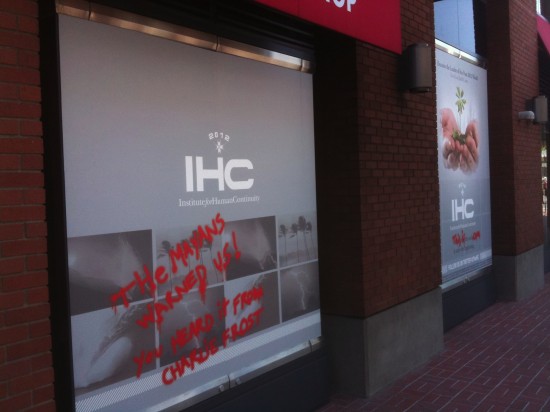 If necessity is the mother on invention, then demand must surely be the foreplay.
If necessity is the mother on invention, then demand must surely be the foreplay.Through a convergence of a number of ways of thinking I'm slowly putting together the story about how the future of learning and consuming will take place. Let me begin with a quote:
As more of our basic needs are met, we increasingly expect sophisticated experiences that are emotionally satisfying and meaningful. These experiences will not simply be products. They will be complex combinations of products, services, spaces, and information.
This is Tim Brown of IDEO in his June 2008 Harvard Business Review article on design thinking. The quote encompasses a lot of what I also view the future to be and the demand for this way of thinking is permeating our entire society.
Two examples to kick-off, what I believe will be a fair amount of future blogposts, are transmedia and the broadening of the education model.
Transmedia (here's the wikipedia entry) roughly is the creation and delivery of a story across multiple forms of media. Here's a nice and thorough history to get you started on cross/trans-media from transmedia creator and chronicler Christy Dena.
While from Christy's preso you'll see that transmedia story telling is nothing new, especially in the world of fiction and film production, I think that it is getting more and more common. We are not surprised to see a computer game released at the same time as the latest Marvel cinema release, we expect it. Or when District 9 was promoted at Comic-con in the US, it wasn't mind-blowing that a team of MNU trucks locked down San Diego and a series of pre-graffitid posters sprung up over night. This is just how we demand movies to be sold to us now.
Some might say its all about eye-balls, that if consumers are switching off the TV in favour of the Web then naturally the dollars will follow where the eye-balls go. And this is right, but at the same time there is another aspect to transmedia that we are demanding and its that of reciprocity and co-creation.
Reciprocity in that if I am going to follow a story across media (chase the rabbit down the hole as it were) then I'm going to want reward in return. Mindless consumption via the idiot-box is over, mindful consumption through multiple media now commands respect. In as much, free downloads now act as rewards for following story-lines, prizes via ARGs go to those who dig the deepest into a story and online games attached to stories act as town-squares where consumers consume together.
And consuming together brings me onto my next point about co-creation. That a story is filmed/written, edited and distributed was once a nice process that meant everyone could play their part, received a cheque and go home to bed. Unfortunately for producers it isn't that simple any more. Consumers are now talking back, they're asking for more, wanting to get involved even. Which is where co-creation is creeping in. We see this now with characters jumping from pre-recorded episodes to live and interactive Twitter accounts (see the current Girl Number 9 web-series).
And of course, this brings me to an article I spotted in today's The Age about beating boredom in the school classroom. The article recounts the experiences and parents and teachers where students are skipping school due to boredom and some of the tactics schools are implementing to confront this problem. Not surprisingly transmedia story telling and co-creation play a large part in turning the problem around:
At Balwyn, students in years 7 to 9 start a program by watching a DVD that acts as a springboard for activities that are integrated across their subjects ...
... Resolving conflict — a theme of the movie — would be discussed in tutorial groups, with each group creating a movie to be presented at the final school assembly.
In turn, year 8 students will film news broadcasts as part of their sustainability program and year 9 students will enter into a music video competition as part of their program.
At my own work, we've been trying to extend the experience of our annual CPA Congress and broaden learning opportunities through changing what's expected (like conferences and training seminars) to providing the new and un-expected (like Second Life conference sessions and made-for-YouTube histories of members experiences).
Transmedia storytelling and the broadening of the education model are to me just two observations of how demand for a more sophisticated and communal way of consumption are mutating the old model of thinking.
So to those who still see this as an experiment or something that 'those' people do not us, all I can say is that it's too late already. The lines of communication will continue to blur. Teachers, soon your students will talk directly to you textbook author and bypass your meagre thoughts. Movie producers, make sure you keep your writers on the payroll because the writing doesn't end when the movie studio commissions your movie. I want to talk to your characters, and I expect them to listen. Between how it was and how it is now is a pretty big pill to take and takes a hell of a lot of effort, but as Tim Brown said, "we increasingly expect sophisticated experiences that are emotionally satisfying and meaningful."

2 comments:
Which school did you go to and what are the best schools that are currently progressive in technology and education in Melbourne?
Cheerio!
Teacher Jane-Sydney
I'm a Monash graduate, but I graduated in 2003 which in technology terms seems a lifetime ago. As far as current progressive universities I'm still hunting around for post-grad courses too. The combination of marketing and technology in a under-grad or post-grad course still seems a way off.
Post a Comment